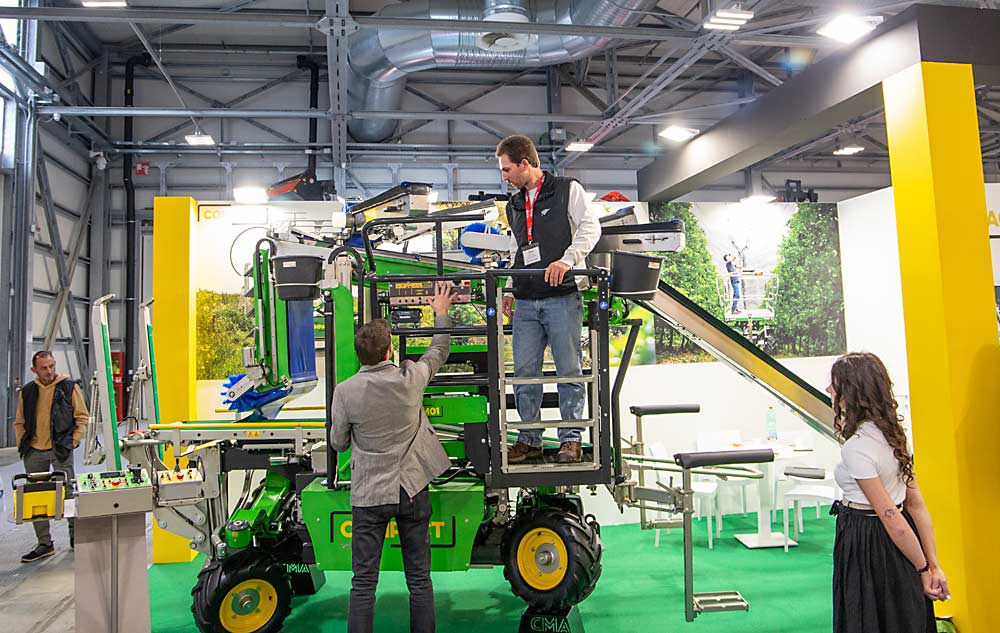
During the International Fruit Tree Association tour of Italy, Ben Keim went shopping.
The Pennsylvania grower wasn’t after cashmere, leather or sunglasses, though Italy certainly has those things. The young orchardist was in the market for a harvest platform that could handle the steep slopes of his Berks County blocks. What better place than Italy, also known for its hilly apple terrain?
Keim allowed Good Fruit Grower to tag along in November as he kicked the tires of about a dozen platforms at two different trade shows during the IFTA visit — EIMA in Bologna and Interpoma of Bolzano. He quizzed reps, climbed ladders, felt controls, collected business cards and took notes.
Back home in December, he collated all that information onto a spreadsheet, discussed things with his family and employees and winnowed the list down to two favorites — the Billo Tapis and the Revo Piuma, both Italian-made machines. He knows they will purchase one by the 2024 season, if not sooner.
“These two machines I’ve selected basically fit with our picking philosophy,” he said. Both allow workers to pick the tops of the trees from the platform, while ground-based workers can also harvest onto conveyors that feed the same bins.
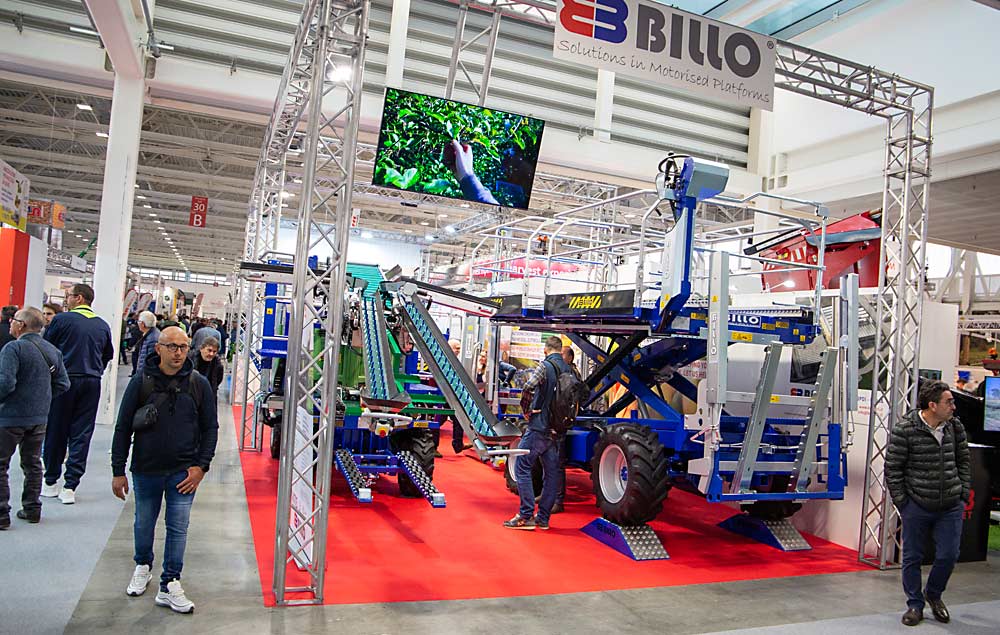
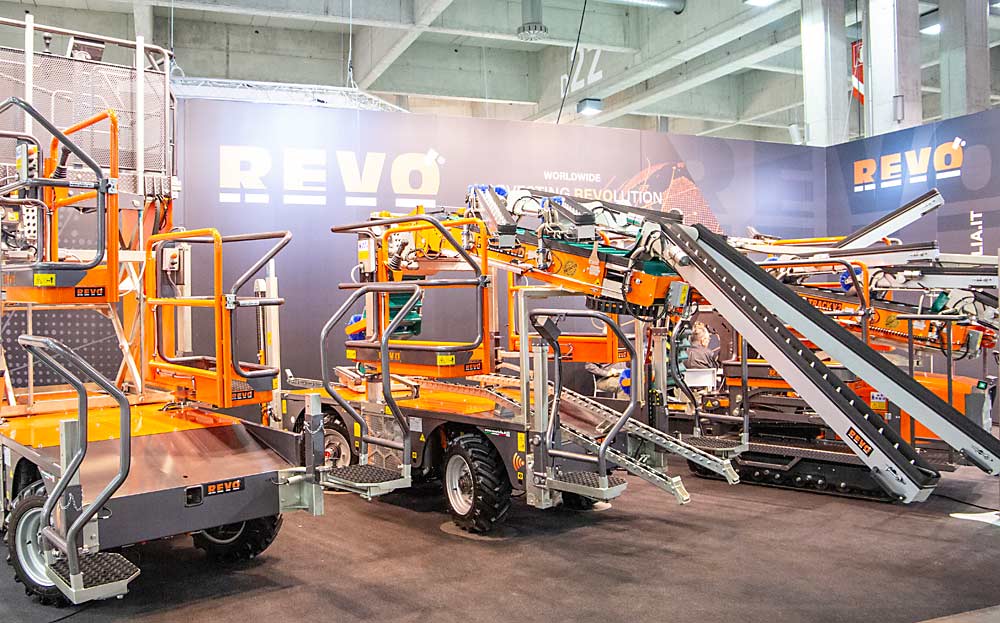
When the Keims finally procure their platform, they won’t be the first in Pennsylvania, but they will be an outlier, said Daniel Weber, Penn State University tree fruit extension educator.
Growers in the state have been moving toward high-density fruiting walls that usher in mechanization, but slowly, Weber said. Many farms still have freestanding, three-dimensional trees, and farms in the area are small, which makes large capital investments a tough ask.
Terrain is indeed steep, Weber said, in Keim’s neighborhood of Eastern Pennsylvania and in Adams County, the state’s south-central growing area.

Weber and other extension specialists have tested platforms for years in both regions and consistently shown they would improve harvest efficiency by 12 to 15 percent. But few growers so far have made the jump.
“It’s a very slow process here,” Weber said.
A lot of growers are talking about platforms though, as Pennsylvania is modernizing, said Jake Scholl of Lehigh County, near Berks County. Like the Keims, his family planted their first trellises years ago with machinery in mind.
Scholl owns one Revo Piuma and expects to need another as his acreage grows.
“I needed something that would work on hillsides,” he said.
The platform does not save him time but rather removes the strain of bags from workers’ shoulders. And with only 22 trellised acres, he often works alongside his employees.
Scholl and Keim envision more harvest-assist platforms entering Pennsylvania’s industry. Keim hopes his experience can inform other growers’ decisions.
One of his first lessons: “There is no one perfect machine,” he said.
Checking the boxes
The options at the Italian trade shows seemed endless. So, Keim broke down the decision into a list and sought machines that checked the most boxes.
First, cost. To get it from Italy to his farm, either platform will run between $75,000 and $117,000, both within his price range. However, he would go higher if another machine proved an even better fit.
Then, bin handling. He divided all the platforms he saw into those that could manage bins and those that require a separate bin trailer. His family is interested in the former because they fit his operation. He and his supervisors usually space out bins in the rows before picking, while bin wagons haul them away later. He also has a few long rows and worries that a trailer wouldn’t hold enough bins to reach the end.
Self-leveling is another critical factor on his side slopes. Both of his top two favorites self-level.
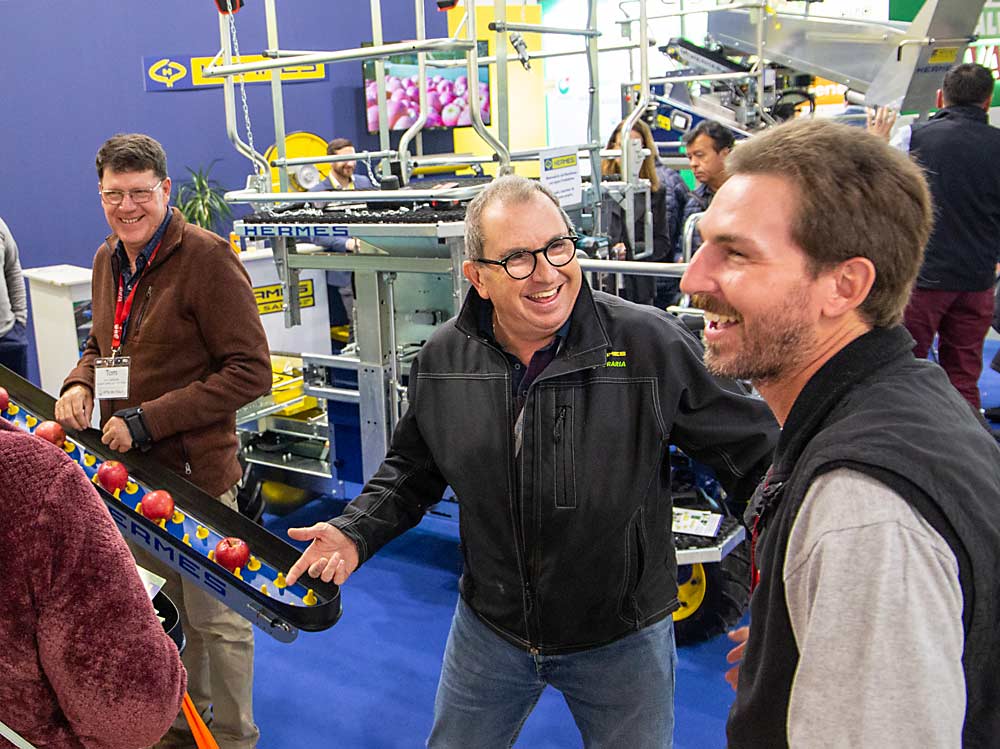
Flexibility is important. He wants the conveyors and bin filler to be removable, so his workers can use the platform for training and thinning as well as harvest. He also wants the ability to fasten and remove a sorting tray, so pickers can cull on the fly. He may not buy that attachment right away — the first block for platform use will probably be Honeycrisp, where workers color pick anyway — but he wants the option.
Both platforms can operate in light rain, and both extend high enough to reach the tops of his tallest trees, roughly 12 feet, with room to spare. And both extend outward to reach trees in his 12-foot rows. The machines self-steer and self-propel slowly enough for his tastes when needed. The Billo creeps as slow as 60 meters per hour; 40 for the Revo. Unloading bins takes 2 or 3 minutes for both, an acceptable time frame for his liking.
And Keim likes the service system from both companies. Both offer video technical support and a willingness to ship parts with express service. Revo has a distributor in Massachusetts for parts, too.
Simplicity is another key.
He chose diesel-driven machines. In Italy, sales teams offered electric versions they said could run three days on a single charge. But Keim would rather spend money delivering diesel to refuel machines than bring the platforms back to the shop to recharge overnight. Also, aside from the sensor that steers, his two favorites also feature more mechanics, such as hydraulics and bearings, than electronic relays. He and his co-workers are mechanics, not electrical engineers, he said.
“I know that’s the way the world is going, but the simpler we can keep the machine for our employees, from a maintenance standpoint, the better,” Keim said.
—by Ross Courtney

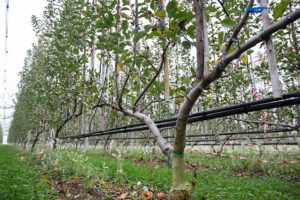
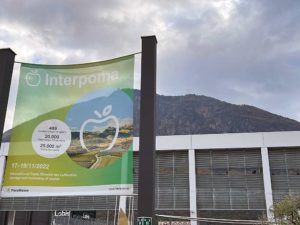





Leave A Comment